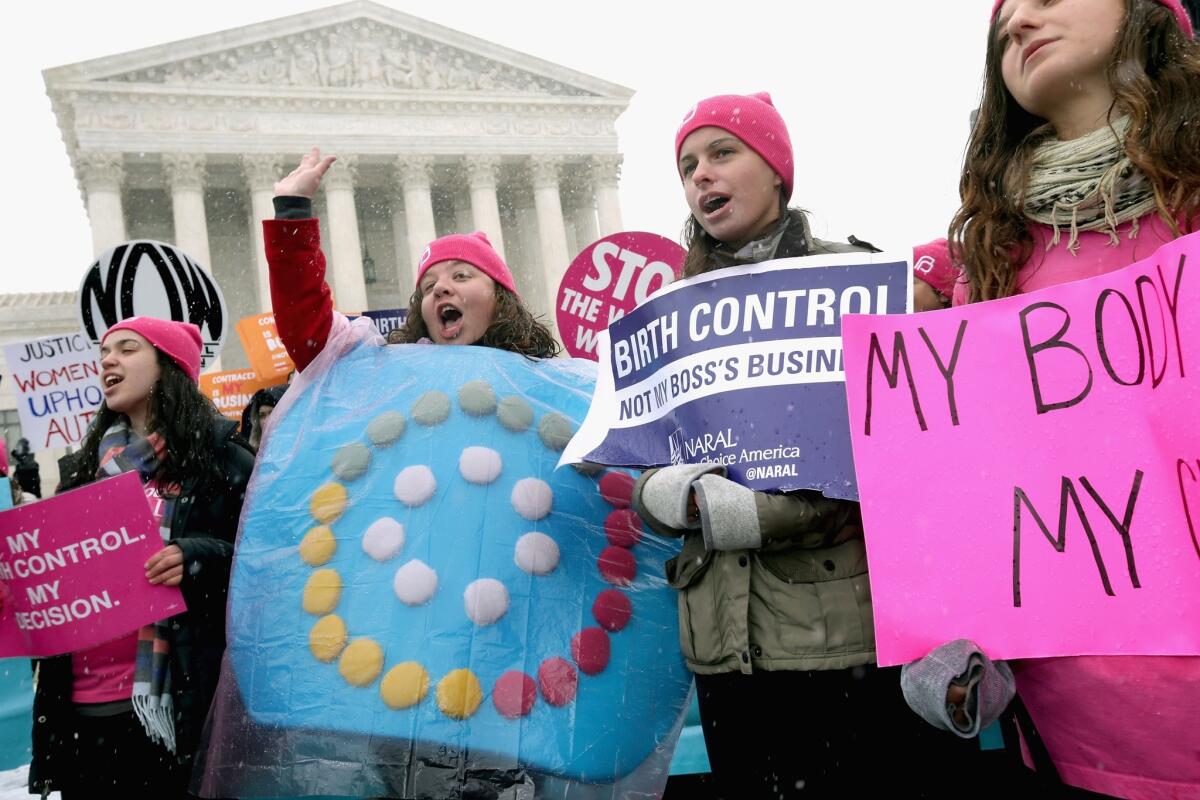Editorial: A battle over birth control the Trump administration should lose

The fight over whether employer-provided health insurance has to cover birth control for women returns to a familiar battleground Wednesday: the U.S. Supreme Court.
How did something as simple and straightforward and profoundly important to a woman’s life as contraception, and insurance for it, become the focus of years of legal wrangling? Because what started as a narrow exemption for religious organizations from a federal mandate to cover birth control has ballooned into Trump administration guidelines allowing any company to claim a religious or moral belief as a way to evade the mandate. That’s going too far, and the Supreme Court needs to put a stop to it.
All these issues stem from the 2010 Affordable Care Act’s requirement that new insurance policies meet minimum federal standards, including coverage of preventive care. The law authorized the Health Resources and Services Administration to issue guidelines to implement that provision. During the Obama administration, the guidelines rightly instructed health plans to include coverage of contraception for women with no out-of-pocket cost.
Houses of worship were exempted in 2013 from having to offer any kind of coverage for birth control. (Under the Religious Freedom Restoration Act, the government can’t impose a “substantial burden” on the exercise of religion unless it’s necessary to further an important government interest and it’s done in the least restrictive way.) And religious nonprofits were allowed to opt out of offering contraceptive coverage as long as they agreed to an accommodation: They filed a one-page form notifying insurers or plan administrators, which would then provide the coverage at no cost to the employer.
Things only got more complicated from there. In 2014, the for-profit craft company Hobby Lobby argued in the Supreme Court that forcing it to offer birth control coverage violated the Religious Freedom Restoration Act because its owners objected on religious grounds to some of the mandated forms of contraception. Unfortunately, the high court agreed, ruling that the government had to find a less restrictive means of providing contraceptive coverage for employees of closely held corporations whose owners had religious objections. One possibility, the court suggested, was offering them the same accommodation that was available to religious nonprofits.
After more legal skirmishing, the Trump administration issued new guidelines allowing any company, if it offered up a sincere religious or moral objection, to refuse to cover its female employees’ birth control. And companies would not even be compelled to offer a workaround. The states of Pennsylvania and New Jersey got a federal court to block the guidelines with a nationwide injunction, upheld by a federal appeals court. Now the case is at the Supreme Court, which is set to hear arguments Wednesday.
To be clear, houses of worship and religiously affiliated groups whose work is intertwined with the practice of their religions should not be compelled to violate their beliefs. The issue here, though, is how to fulfill the government’s compelling interest in providing access to preventive care, as Congress mandated in the Affordable Care Act, without trampling on religious rights.
The workaround developed by the Obama administration met that test, severing religious-affiliated employers from any financial connection to the contraceptive coverage in the policies offered to their employees. The guidelines the Trump administration adopted last year, however, pretend that enabling women to obtain contraceptive coverage is merely optional. They would fully exempt any company whose owners (no matter the number) claim that the contraceptive mandate goes against their conscience, forcing their employees to find contraceptive coverage through separate policies or subsidized programs.
Of course, many companies — probably most — would not take away coverage of contraception even if they were allowed to cite a religious or moral objection. Employers compete for workers based in part on the health benefits they offer. Yet even the Trump administration estimates that as many as 120,000 women could be affected, and the National Women’s Law Center contends that the total will be far higher.
It’s true the Affordable Care Act doesn’t explicitly require birth control be included in new insurance policies. But it does explicitly require those policies to cover preventive healthcare for women. And the Obama administration correctly interpreted that requirement to include coverage of birth control, with rare exceptions for religious employers and with a reasonable accommodation for others with religious objections. The Trump administration shouldn’t be allowed to ignore the will Congress expressed in the Affordable Care Act to placate his supporters on the religious right.
More to Read
A cure for the common opinion
Get thought-provoking perspectives with our weekly newsletter.
You may occasionally receive promotional content from the Los Angeles Times.










